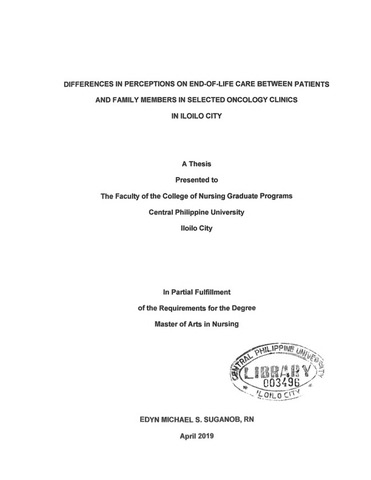Differences in perceptions on end-of-life care between patients and family members in selected oncology clinics in Iloilo City
| dc.contributor.adviser | Porque, Gelbert Jan S. | |
| dc.contributor.author | Suganob, Edyn Michael S. | |
| dc.coverage.spatial | Iloilo | en_US |
| dc.date.accessioned | 2021-02-11T01:49:42Z | |
| dc.date.available | 2021-02-11T01:49:42Z | |
| dc.date.issued | 2019 | |
| dc.identifier.citation | Suganob, E. M. S. (2019). Differences in perceptions on end-of-life care between patients and family members in selected oncology clinics in Iloilo City (Unpublished Master's thesis). Central Philippine University, Jaro, Iloilo City. | en_US |
| dc.identifier.uri | https://hdl.handle.net/20.500.12852/283 | |
| dc.description | Abstract only | en_US |
| dc.description.abstract | End-of-Life Care (ELC) has recently gained attention from the medical professionals due to the increasing population of patients who are experiencing chronic and terminal illnesses, such as cancer. This descriptive relational study was conducted to determine the differences in perceptions of ELC between patients and family members. The data was gathered using a questionnaire from 80 patients and family members who were chosen purposively. The data were analyzed using SPSS. Descriptive statistics (mean, frequency tables) and inferential statistics (Cramer’s V and Gamma) were used. In the medical outpatient clinics, cancer was found to be common among female, middle adults, and married individuals. Family members who care for the cancer patients are mostly middle adults, and college graduates. The findings reveal that there are differences on the patient and family members’ perception of ELC measures, specifically on: preserving life, allowing resuscitation, use of ventilator, ICU admission, NGT feeding, parenteral nutrition, and undergoing dialysis. Family members tend to be more supportive on ELC measures than the patients. They only have the same perception on the pain relief, allowing the use of vasopressor drugs, and blood transfusion. Based on the characteristics, only the patient’s cancer site has a strong influence on the ELC measures. The family member’s marital status, monthly income and relationship with the patient has some bearing on how they perceive ELC. With the differences on their perception on ELC, advocating for advance directives is recommended. If allowed by the patient, family members closely involved in healthcare decision making must also be included in the discussions to ensure congruence between the decision of the patient and family members. | en_US |
| dc.format.extent | viii, 71 leaves | en_US |
| dc.language.iso | en | en_US |
| dc.subject.ddc | GSL Theses 610.73072 Su32 | en_US |
| dc.subject.lcsh | Death | en_US |
| dc.subject.lcsh | Terminal care | en_US |
| dc.subject.lcsh | Terminal care--Social aspects | en_US |
| dc.subject.lcsh | Cancer--Patients | en_US |
| dc.subject.lcsh | Families | en_US |
| dc.subject.lcsh | Perception | en_US |
| dc.subject.lcsh | Oncology | en_US |
| dc.subject.lcsh | Philippines--Iloilo | en_US |
| dc.subject.mesh | Terminal Care | en_US |
| dc.title | Differences in perceptions on end-of-life care between patients and family members in selected oncology clinics in Iloilo City | en_US |
| dc.type | Thesis | en_US |
| dc.description.bibliographicalreferences | Includes bibliographical references | en_US |
| dc.contributor.chair | Alibogha, Salex E. | |
| dc.contributor.committeemember | Baldon, Charlie D. | |
| dc.contributor.committeemember | Sale, Melba C. | |
| dc.contributor.committeemember | Canaman, Jessica B. | |
| dc.contributor.committeemember | Vilches, Celina G. | |
| dc.contributor.department | School of Graduate Studies | en_US |
| dc.description.degree | Master of Arts in Nursing | en_US |


